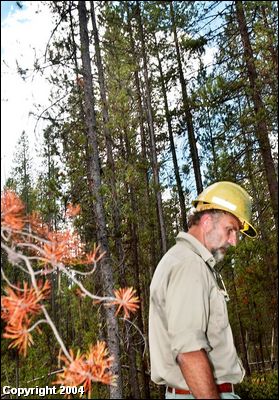forum
library
tutorial
contact

Workshop Takes a Look at How Wildfires
May Help Or Hurt Columbia Basin Salmon
by Staff
Columbia Basin Bulletin, May 22, 2015
|
the film forum library tutorial contact |

|
Workshop Takes a Look at How Wildfires
by Staff
|
 Fire and aquatic scientists gathered last week in Portland on the brink of an anticipated severe wildfire season to discuss how wildfires may help or hurt habitat for salmon, trout and other aquatic life and how restoration of fish habitat can improve its resiliency to fire and other influences such as climate change.
Fire and aquatic scientists gathered last week in Portland on the brink of an anticipated severe wildfire season to discuss how wildfires may help or hurt habitat for salmon, trout and other aquatic life and how restoration of fish habitat can improve its resiliency to fire and other influences such as climate change.
The May 13 Fire Science Workshop, "Understanding the Effects of Fire on Aquatic Ecosystems," included expert presentations and panel discussions on how fish respond to the effects of wildfire, how fires affect salmon streams and what kinds of restoration can best help fish and their habitat withstand wildfires that are a fact of life across the Columbia Basin.
The workshop was sponsored by the Federal Caucus, an organization of 10 federal agencies with management responsibilities in the Columbia Basin, as well as Ecotrust and Ecotrust Forest Management.
"Fires and fish span many boundaries and we all need to understand how one affects the other," said Mary Lou Soscia, Columbia River Coordinator for the Environmental Protection Agency and chair of the Federal Caucus. "All of us in the Columbia Basin have an interest in using limited restoration resources to not only improve fish habitat but make it as resilient as we can for the long term."
Scientists from the U.S. Forest Service, U.S. Geological Survey, Idaho State University and conservation groups spoke at the workshop on subjects such as how fires influence the delivery of logs and other wood materials that often improve fish habitat and how to plan habitat restoration in the context of wildfires. State and tribal natural resources managers also participated.
Workshop presentations can be found at: www.salmonrecovery.gov/Newsroom/Recentstories/FireScienceWorkshop.aspx
"Habitat restoration programs across the basin must take fire science into account if those programs are going to successfully help recover threatened and endangered fishes," said Linda Ulmer, the U.S. Forest Service representative for the Federal Caucus. "Many agency and university scientists will continue to study how wildland fires influence river and stream habitat. At the workshop they will share their findings and ideas with restoration practitioners and policy-makers to support conservation on a changing landscape."
Jason Dunham, an aquatic ecologist with the U.S. Geological Survey, said his studies had found that with less tree and vegetation cover post-fire, juvenile fish grow faster while fewer adult fish can use the habitat. He affirmed, though, that fish can and do adapt to post-fire landscapes. He encouraged people to "manage for the mess. Preserve the processes that create and maintain complexity in nature."
Other scientists discussed how fires can help deliver wood to streams and the resulting benefits for fish and how food webs are affected by fire.
The common theme was that fire can be beneficial. "We have to rebuild the landscape," said Paul Hessburg, a research landscape ecologist with the USDA-Forest Service. Carpets of same-sized evergreens on many of today's Pacific Northwest hills and slopes don't look anything like the "patchy" landscapes some 80 years ago when fires were less aggressively controlled. "We have an epidemic of trees and the fires are showing us that," he said.
Some of the conclusions from the workshop:
learn more on topics covered in the film
see the video
read the script
learn the songs
discussion forum
